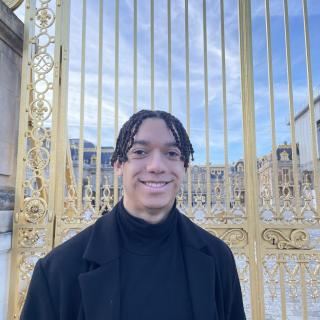 Meet Elizabeth Weight (IES Abroad Nantes, Fall 1987 & IES Abroad Paris, Spring 1988 | Connecticut College), Regional Drought Information Coordinator at NOAA: National Oceanic and Atmospheric Administration. An adventurous spirit led Elizabeth abroad for a gap year before she began Connecticut College, and sparked her curiosity for more study abroad her junior year with IES Abroad in France.
Meet Elizabeth Weight (IES Abroad Nantes, Fall 1987 & IES Abroad Paris, Spring 1988 | Connecticut College), Regional Drought Information Coordinator at NOAA: National Oceanic and Atmospheric Administration. An adventurous spirit led Elizabeth abroad for a gap year before she began Connecticut College, and sparked her curiosity for more study abroad her junior year with IES Abroad in France.
Read on to learn about Elizabeth’s fascinating career in agricultural water management working in developing countries around the world.
IES Abroad: What led you to study abroad? How did you choose the IES Abroad Nantes and Paris programs?
Elizabeth Weight (EW): I actually studied Russian in high school and spent a gap year in Yugoslavia and Greece. I saved up all my babysitting money and stayed with a Yugoslavian friend for part of the time, and then camped with young people over the summer. I then moved to the Greek island of Kalymnos, where I wove rugs that were sold to tourists. I loved that experience, so before I started college, I knew I wanted to study abroad.
I chose to study abroad in France and took French classes in the summer so my language skills would be sufficient to study abroad in Nantes. After a semester in Nantes, I wanted to live in a more diverse city, so I enrolled for a second semester in Paris and took classes at the Institut Catholique. Studying abroad in France was a great decision because I learned French well enough to work in French in Belgium for several years after college and in Africa for several years.
IES Abroad: What is a key memory from your time in France? An ‘ah-ha’ moment? How did your thinking, actions, or plans change?
EW: Being challenged academically and learning French at a French university were extremely valuable. In addition to communication skills, learning a foreign language in depth allowed me to see that people from other countries view the world within their own cultural narrative.
I learned that how we interpret and understand a context, a situation, and the world around us is deeply influenced by our cultural norms and histories. Understanding how people in other countries view a situation from a different perspective has been invaluable to me time and time again in my career working in many countries and diverse cultures around the world.
IES Abroad: You’ve spent many years working abroad. Was your decision to work abroad deliberate? What challenges and surprises did you face?
EW: After college I worked for the private sector in Belgium, then with the United Nations in Djibouti and Somalia, and then for non-profit organizations in Cambodia, Ghana, Sri Lanka, and many other countries in Africa and Asia.
My work in Cambodia was initially with the American Friends Service Committee (AFSC) with a focus on animal health, agriculture, and water management. That work led to a greater understanding that agriculture is critical to the livelihoods of the majority of poor people in the world and to the realization that we must sustain vital ecosystem services that underpin every aspect of those livelihood systems. I returned to the United States and completed a Master’s degree in Environmental Economics and Policy at Duke University, and then returned to Cambodia to work for the United Nations Development Program at Cambodia's Ministry of the Environment.
Since then, my work has continued to focus on the intersection of agriculture, water management, poverty reduction, and the environment. I joined iDE and had the opportunity to work across 11 different countries as the director for evaluating the organization's impacts. I also had a wonderful experience working for four years in Sri Lanka for the International Water Management Institute (IWMI) linking IWMI's research to decision making in 14 countries in Africa and Asia.
I love working at the intersection of science and decision making to strengthen evidence-based decisions, which is critical given that our world faces many complex challenges. I continue this work, currently liaising between the National Oceanic and Atmospheric Administration’s (NOAA) incredible science and amazing scientists to strengthen drought early warning systems in the western United States (Colorado, Utah, New Mexico, Arizona, Texas, and Oklahoma).
IES Abroad: What advice do you have for students interested in studying or interning abroad, particularly those studying in the STEM fields?
EW: Whenever I talk with young people, I encourage them not to stress about having everything laid out by the time they are 18. I had no idea that studying abroad in college would prepare me for the amazingly interesting and fulfilling career that I have had, in part because I did not know this career option existed when I was younger.
So, my advice is to pursue what you love right now. You don’t have to know everything now to take the next step towards your passion. Don't be afraid to reject our culture's definition of success as a certain standard of living or a specific type of career that may not be fulfilling for you. Live with intention and put your whole self into whatever you are doing 110% and all the rest will come one step at a time.
Learn more about studying abroad in France and our 14 different programs across the country.
Check out all of our Alum of the Month profiles to see real examples of how study abroad changed the lives and careers of our former students.





